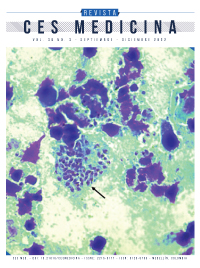Expectant management in severe preeclampsia remote from term (24-33.6 weeks): experience in a high complexity center
DOI:
https://doi.org/10.21615/cesmedicina.6881Keywords:
preeclampsia, severe remote pregnancy preeclampsia, expectant management, maternal and perinatal morbilityAbstract
Introduction: severe preeclampsia before 34 weeks of gestational age has a high risk of maternal and fetal complications. Expectant management could decrease the risk of complications associated with premature birth. Objective: to evaluate the efficacy of expectant management in the prevention of maternal and perinatal adverse events of patients with severe preeclampsia remote from term. Methodology: a retrospective cohort study in pregnant women diagnosed with severe preeclampsia between 24 and 33.6 weeks of gestational age who were admitted in a Colombian high complexity medical center between 2011 and 2019 was carried out. Descriptive measurements of the expectant management and the interventionist management were compared and the association with maternal and neonatal composite outcomes. Results were adjusted by gestational age under 28 weeks of delivery. Results: 134 patients were analyzed; 110 patients with expectant management and 24 interventionist management. Expectant management had a lower probability of cesarean section (RR 0.79 CI95% 0.69-0.91) and maternal composite result (RR 0.67 CI95% 0.57-0.79) that did not persist after the adjustment. Expectant management had a lower probability of APGAR <7 the first minute (21.6% vs. 40%, RR 0.53 CI95% 0.29-0.97) and neonatal composite result (60% vs. 83.3%, RR 0.72 CI95% 0.57-0.90). When adjusting the age under 28 weeks of delivery, the expectant management showed a lower probability of APGAR under 7 at minute one (RR 0.43 CI95% 0.24-0.75), composite outcome of perinatal adverse events (RR 0.62 CI95% 0.48-0.81), neonatal death (RR 0.26 CI95% 0.29-0.71), respiratory distress syndrome (RR 0.65 CI95% 0.48-0.88), intraventricular hemorrhage (RR 0.31 CI95% 0.11-0.89) and admission to the neonatal intensive care unit (RR 0.80 CI95% 0.70-0.92). Conclusion: severe preeclampsia remote from term is a severe and complex disease which faces maternal and neonatal interests. Due to approach controversies, management should be performed in high complexity centers with a multidisciplinary approach individualizing each binomial; our findings suggest expectant management is reasonable when both maternal and fetal conditions allow it, especially in pregnancies under 28 weeks of gestational age to improve fetal outcomes without risking maternal outcomes.
Downloads
References
Hypertension G. ACOG Practice Bulletin No. 202: Gestational Hypertension and Preeclampsia. Obstet Gynecol. 2019;133(1):e1–25.
Wisner K. Gestational Hypertension and Preeclampsia. MCN Am J Matern Nurs. 2019;44(3):170.
Sibai BM. Evaluation and management of severe preeclampsia before 34 weeks’ gestation. Am J Obstet Gynecol. 2011;205(3):191–8.
Quintero-Ortíz MA, Grillo-Ardila CF, Amaya-Guio J. Expectant Versus Interventionist Care in the Management of Severe Preeclampsia Remote from Term: A Systematic Review. Rev Bras Ginecol e Obstet. 2021;43(8):627–37.
Venkatesh KK, Strauss RA, Westreich DJ, Thorp JM, Stamilio DM, Grantz KL. Adverse maternal and neonatal outcomes among women with preeclampsia with severe features <34 weeks gestation with versus without comorbidity. Pregnancy Hypertens [Internet]. 2020;20(November 2019):75–82. Available from: https://doi.org/10.1016/j.preghy.2020.03.006
Gracia PV, Gracia PV. Manejo expectante o conserva dor de preeclampsia grave lejos del término. Manejo Expect o Conserv dor preeclampsia grave lejos del término. 2014;60(4):379–84.
Brice C, Brice L. Conducta obstétrica basada en evidencias. Preeclampsia severa: ¿tratamiento agresivo o expectante? Ginecol Obstet Mex. 2007;95–103.
Churchill D, Duley L, Thornton JG, Moussa M, Ali HSM, Walker KF. Interventionist versus expectant care for severe pre-eclampsia between 24 and 34 weeks’ gestation. Cochrane Database Syst Rev. 2018;2018(10).
Rafael DM, Cartagena C, Cartagena RC, Patricia MS, Francisco S, Carlos RE. Resultados materno perinatales de la preeclampsia lejos del término. Clínica de Maternidad Rafael Calvo. Cartagena. Colombia. Rev Ciencias Biomédicas. 2011;2(2).
Vigil-De Gracia P, Reyes Tejada O, Calle Miñaca A, Tellez G, Chon VY, Herrarte E, et al. Expectant management of severe preeclampsia remote from term: The MEXPRE Latin Study, a randomized, multicenter clinical trial. Am J Obstet Gynecol. 2013;209(5):425.e1-425.e8.
Martin JN, Rose CH, Briery CM. Understanding and managing HELLP syndrome: The integral role of aggressive glucocorticoids for mother and child. Am J Obstet Gynecol. 2006;195(4):914–34.
Nardozza LMM, Caetano ACR, Zamarian ACP, Mazzola JB, Silva CP, Marçal VMG, et al. Fetal growth restriction: current knowledge. Vol. 295, Archives of Gynecology and Obstetrics. Springer Berlin Heidelberg; 2017. 1061–1077 p.
Rendón CA, Ortiz RA. Respuestas a: comentarios sobre el artículo “comparación de dos protocolos de manejo en preeclampsia severa lejos del término, y resultados maternos y neonatales: una cohorte histórica hospital universitario san josé, popayán (colombia).” Rev Colomb Obstet Ginecol. 2016;67(3):250–1.
Sibai BM, Mercer BM, Schiff E, Friedman SA. Aggressive versus expectant management of severe preeclampsia at 28 to 32 weeks’ gestation: A randomized controlled trial. Am J Obstet Gynecol [Internet]. 1994;171(3):818–22. Available from: http://dx.doi.org/10.1016/0002-9378(94)90104-X
Coviello EM, Iqbal SN, Grantz KL, Huang CC, Landy HJ, Reddy UM. Early preterm preeclampsia outcomes by intended mode of delivery. Am J Obstet Gynecol [Internet]. 2019;220(1):100.e1-100.e9. Available from: https://doi.org/10.1016/j.ajog.2018.09.027
Buelvas Ochoa YM, Bula Romero J, Cuadrado Banda CJ. Resultados maternos y neonatales en mujeres con trastornos hipertensivos en embarazos lejos del término. Rev Colomb Enfermería. 2021;20(1):e032.
Haddad B, Deis S, Goffinet F, Paniel BJ, Cabrol D, Sibaï BM. Maternal and perinatal outcomes during expectant management of 239 severe preeclamptic women between 24 and 33 weeks’ gestation. Am J Obstet Gynecol. 2004;190(6):1590–5.
Bombrys AE, Barton JR, Nowacki EA, Habli M, Pinder L, How H, et al. Expectant management of severe preeclampsia at less than 27 weeks’ gestation: maternal and perinatal outcomes according to gestational age by weeks at onset of expectant management. Am J Obstet Gynecol. 2008;199(3):247.e1-247.e6.
Vélez-Cuervo SM, Gutiérrez-Villegas LM. Conducta expectante en preeclampsia grave: revisión narrativa. Ginecol Obstet Mex. 2022;90(2):165–73.
Downloads
Published
How to Cite
Issue
Section
License
Copyright (c) 2022 CES Medicina

This work is licensed under a Creative Commons Attribution-NonCommercial-ShareAlike 4.0 International License.
Derechos de reproducción (copyright)
Cada manuscrito se acompañará de una declaración en la que se especifique que los materiales son inéditos, que no han sido publicados anteriormente en formato impreso o electrónico y que no se presentarán a ningún otro medio antes de conocer la decisión de la revista. En todo caso, cualquier publicación anterior, sea en forma impresa o electrónica, deberá darse a conocer a la redacción por escrito.
Plagios, duplicaciones totales o parciales, traduccones del original a otro idioma son de responsabilidad exclusiva de los autores el envío.
Los autores adjuntarán una declaración firmada indicando que, si el manuscrito se acepta para su publicación, los derechos de reproducción son propiedad exclusiva de la Revista CES Medicina.
Se solicita a los autores que proporcionen la información completa acerca de cualquier beca o subvención recibida de una entidad comercial u otro grupo con intereses privados, u otro organismo, para costear parcial o totalmente el trabajo en que se basa el artículo.
Los autores tienen la responsabilidad de obtener los permisos necesarios para reproducir cualquier material protegido por derechos de reproducción. El manuscrito se acompañará de la carta original que otorgue ese permiso y en ella debe especificarse con exactitud el número del cuadro o figura o el texto exacto que se citará y cómo se usará, así como la referencia bibliográfica completa.
| Article metrics | |
|---|---|
| Abstract views | |
| Galley vies | |
| PDF Views | |
| HTML views | |
| Other views | |



